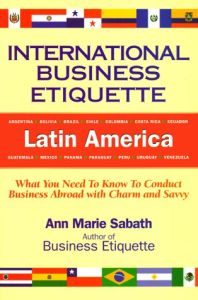Join getAbstract to access the summary!

Join getAbstract to access the summary!
Ann Marie Sabath
International Business Etiquette: Latin America
What You Need to Know to Conduct Business Abroad with Charm and Savvy
Career Press, 1999
What's inside?
Welcome to the land where punctuality doesn’t matter much, but personality does.
Recommendation
Ann Marie Sabath, the Amy Vanderbilt of international etiquette, provides a concise, upbeat and authoritative guide to Latin American social and business etiquette. Her manual covers dos and don’ts and includes basic data about each country, including information on history, air travel, telephones, currency, holidays, language, religion, time zones and weather. Her compact volume presents an informative outline that will help you act appropriately at work and at play in 14 Latin American countries. getAbstract recommends this book to those who work with people from Argentina, Bolivia, Brazil, Chile, Colombia, Costa Rica, Ecuador, Guatemala, Mexico, Panama, Paraguay, Peru, Uruguay and Venezuela, and to those who travel to these countries on business. Have a good, safe trip, or as they say in Latin America, Vaya con Dios.
Summary
About the Author
Ann Marie Sabath is the author of Business Etiquette and Business Etiquette in Brief She is the founder and president of At Ease, Inc., which specializes in domestic and international business etiquette. She is also the author of two other volumes in the International Business Etiquette series, on Asia and the Pacific Rim and on Europe. She has trained employees of many major companies, including Fidelity Investments, the Huffy Corporation, Saks Fifth Avenue, Deloitte and Touche, MCI Telecommunications and the Marriott Corporation.









Comment on this summary